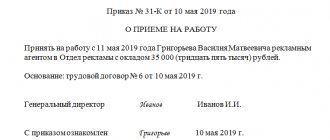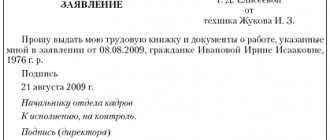What is considered overtime work?
According to the law, this type of work includes the employee performing duties, in accordance with his job description, after the working day or shift established for him.
Moreover, this work must be carried out with the knowledge of the management of the business entity. If an employee starts work without the consent of management, he may not be paid for overtime work.
She also cannot be considered to perform official duties outside of her working day if her employment contract provides for an irregular day schedule.
Part-time work when an employee performs duties stipulated by several job descriptions does not apply to overtime.
Overtime compensation
As mentioned above, the Labor Code provides for two options for compensation for overtime work - money or additional rest (Article 152 of the Labor Code of the Russian Federation). At the same time, it is the “monetary” option that is fixed as the main one. Additional rest is provided at the employee’s request.
This means the following. If there is no statement from the employee that he wishes to receive additional rest instead of money, the employer is obliged to pay him overtime at an increased rate. This amount depends on the duration of the overtime: the first two hours are paid at one and a half times the rate, the rest - at double. The duration of overtime is calculated for each case of overtime work based on the Working Time Sheet.
Note that the Labor Code does not specify in what form and when an employee may express a desire to replace monetary compensation with additional rest. It turns out that he can make his choice at any time, including after receiving payment. Therefore, in order to avoid conflicts and unnecessary work for the accounting department in recalculating payments, we recommend agreeing on this issue in advance, in the document with which the employee agrees to the processing. The wording here may be as follows: “In addition, we notify you that, according to Article 152 of the Labor Code of the Russian Federation, at the request of the employee, overtime work is compensated by providing additional rest time, but not less than the time worked overtime. In this regard, we ask you to indicate whether you would like to receive additional rest time. In this case, overtime work will be paid to you at the normal rate."
Please note that the Labor Code does not contain a rule obliging the employer to provide additional rest time exactly when the employee requires it. Accordingly, this issue should be resolved by agreement of the parties. The agreement reached can be recorded in the shift schedule for the next period, if one is drawn up in the organization. And if a schedule is not drawn up, then an order is issued to provide additional rest time. The order should indicate the name and position of the employee who is entitled to additional rest, and the reason why it is provided. The employee must be familiarized with this order and signed. In the Timesheet, this vacation is about or 28 “Additional days off (without pay).”
The difference between overtime hours and irregular hours
If an employee has an irregular schedule under his contract, he will not have overtime hours.
At their core, the working day is not according to the norm and overtime work is the same thing, only they are paid and processed differently.
An irregular day is necessarily stipulated in the employment contract concluded with the employee. For this, the employee is entitled to additional vacations, as well as, in agreement with the company management, a larger salary. This regime can be established only for certain employees, and this must be recorded in the local acts of the enterprise.
Work on an irregular schedule has no regulatory restrictions; the Labor Code of the Russian Federation establishes that it should be irregular in nature and carried out when necessary. There are no more restrictions.
Any company employee can be involved in overtime work, unless he belongs to categories for which this work is prohibited by law. The provision for such hours is not included in employment contracts with the employee; the procedure for their payment is provided for in the regulations on remuneration and bonuses within the company.
The Labor Code of the Russian Federation establishes that overtime work should not exceed certain standards for each employee.
Overtime and salary
When calculating the additional payment for overtime above, we also took into account the cost of an hour of work. But how to calculate it? If an employee receives a net salary , then everything is simple: its size is divided by the number of hours in the accounting month according to the production calendar. If working hours are taken into account summed up over a longer period, for example, a quarter, then the average daily earnings are calculated for this period.
But what if bonuses and allowances are added to the salary? Should they be taken into account when calculating average daily earnings? Article 152 of the Labor Code of the Russian Federation does not say this. The procedure for paying overtime based on earnings, taking into account bonuses and other incentive payments, can be prescribed in the employment contract or local regulations. But what if it doesn’t say that there either? Then experts recommend being guided by the decision of the Supreme Court of the Russian Federation of June 21, 2007 No. GKPI07-516. It states that in this case only the “bare” salary is taken into account.
Is the employee's consent required?
The legislation provides for two cases of involving employees in working overtime: with the consent of the employee or without.
There is also a list of citizens who in no case can perform the work function assigned to them outside of school hours. Consent is not required in the following cases:
- Accidents, disasters - to prevent them or eliminate their consequences;
- Emergency situations or declaration of martial law;
- To carry out mandatory public works to establish the functioning of important infrastructures (water supply, electricity supply, transport, communications, etc.).
Company management can also, with written consent, require an employee to work overtime if:
- The shift employee did not show up on time to ensure continuity of the technological process;
- It is necessary to repair and restore production equipment (temporary) to ensure continued operation;
- In order to complete the work begun, which cannot be completed the next day as part of a normal day to ensure the safety of property, health and life of citizens.
The Labor Code of the Russian Federation also establishes a list of workers who cannot be involved in overtime. These include:
- Employees expecting children;
- Workers who are under 18 years of age;
- Employees studying under a contract;
- and other citizens provided for by federal laws.
In addition, there are categories of employees who can be employed overtime with written consent and compliance with the conditions of their admission (medical report, notification of the opportunity to refuse, etc.). These include employees with disabilities, employees with young children (under 3 years old), single parents (children under 5 years old), employees with disabled children or other family members who are supervised, etc.
Related documents
- Minutes of the meeting of the trade union committee
- Minutes of the meeting of the trade union committee (option 2)
- Minutes of the reporting and election trade union meeting (conference)
- Minutes of the trade union meeting (conference)
- Minutes of the trade union meeting
- Consent to the processing of personal data
- Extract from the decision of the trade union committee on the opinion of the trade union in connection with the proposed dismissal of the employee
- Example of an order to change the staffing structure
- An example of a notification to a trade union committee about measures to reduce the organization's workforce
- An example of an employee notice of dismissal due to a reduction in the organization's workforce
- An example of a notification to an employment service about a reduction in the organization's workforce
- An approximate form of warning an employee about dismissal due to a reduction in the number or staff of employees
- Notification of upcoming dismissal due to a reduction in the number or staff of employees
- Equipment commissioning certificate
- Certificate of marriage based on the results of an inspection of the object
- Certificate of return of defective goods
- Report on shortage and/or mis-grading of goods
- Act on establishing discrepancies in quantity upon acceptance of goods
- Certificate of acceptance and transfer of equipment. Equipment commissioning certificate
- Certificate of acceptance of products for quality (Certificate of defects)
Procedure for recording overtime working hours
Legislation requires the management of the company to compulsorily record overtime hours for each employee, in order to compare them with current standards and pay. To do this, use a working time sheet, where this information is entered using an alphabetic (C) or numeric (04) code.
Documentation of overtime
Step 1. Obtaining the employee’s consent to work overtime
In case of production necessity, the company management requests written consent from the employee to increase his work day or shift. It is best to write out these documents in duplicate, so that the employee personally signs either consent or refusal on the employer’s letterhead.
When written consent is not required, the employee is sent a letter requiring him to begin overtime work.
If necessary, in addition to this, some employees are also sent a notice informing them of the right to refuse this work. Also, the personnel service should examine the personal file for a medical report on the possibility of involving a disabled employee in overtime.
Step 2. Drawing up an order from the manager
After complying with the specified formalities, the director of the company issues an order to involve workers in overtime work. It can be drawn up in free form, but must contain a justification for production necessity, a list of workers who are expected to be employed overtime, details of the documents that serve as the basis (official or memos, consent to hire, etc.).
How long can it last
It must be clearly understood that the maximum duration of activities outside of school hours at the initiative of management is fixed in law. In accordance with Part 6 of Article 99 of the Labor Code of the Russian Federation, this is no more than 120 hours per year. There is a more convenient guideline - no more than 4 hours over two days. However, from June 29, 2017, thanks to Federal Law No. 125 dated June 18, 2017, if personnel perform overtime work on their day off or holiday and if such activity is paid at an increased rate or is compensated by providing another day of rest in accordance with Article 153 of the Labor Code, then the duration of such work is not limited according to the rules of Article 99 of the Labor Code of the Russian Federation. For example, an employee was brought to work on his day off, the work was delayed, and instead of the required eight hours he worked ten. The employee will receive money for the shift on his day off, but there are still two hours of overtime left. If these two hours are paid (at an increased rate) in the manner prescribed by Article 153 of the Labor Code of the Russian Federation, then they will not be accounted for as overtime.
By law, it is the employer who is required to keep records of the time worked by the employee. If it turns out that management violates labor safety requirements or otherwise neglects the rules for attracting citizens to additional work, the company and its officials face fines under Art. 5.27 Code of Administrative Offenses of the Russian Federation.
Overtime pay
The Labor Code of the Russian Federation states that overtime payments must be made at least 1.5 times for the first two hours, and 2 times for all subsequent hours. This means that the Payment Regulations and other regulations of the enterprise itself may provide for other amounts, the main thing is that they are greater than the established minimum.
Attention! In addition, the legislation provides the right to the employee, according to which he can choose either increased pay or regular pay with the provision of additional rest time, but not less than the hours worked. Therefore, when notifying and obtaining consent for overtime work, it is advisable to request the type of compensation from the employee in writing.
It is also necessary to take into account that the enterprise may operate a piecework or salary system of payment. In this case, for the calculation, not the hourly tariff rate is taken, but the piece rate for the products produced, or the corresponding part of the salary (that is, the salary divided by the standard working time, expressed in hours).
Video about processing processing
Overtime is an important tool for the employer to solve urgent production problems. But attracting workers beyond the agreed working hours can be very, very difficult - this is due to their personal opinion on this matter, the need to spend money financially, and many restrictions and formalities. In order to comply with the letter of the law and not be fined, the employee responsible for working with personnel must take into account all the nuances in each individual case of overtime.
- Author: ozakone
Rate this article:
- 5
- 4
- 3
- 2
- 1
(0 votes, average: 0 out of 5)
Share with your friends!
Employer's liability
In order to save money, the administration may try to hide overtime hours, as well as involve people in this work who are prohibited by law.
Management often claims that the employee has a special regime with irregular hours, however, they need to take into account that this must be provided for in the employment contract of this employee.
For violation of the procedure for involving an employee in overtime work, the employer is liable in accordance with the Code of Administrative Offenses for non-compliance with labor legislation.
Important! According to the Administrative Code, fines from 30,000 to 50,000 rubles can be imposed on a company, and on its responsible persons - from 1,000 to 5,000 rubles. In case of repeated cases, the amount of sanctions increases significantly, and disqualification of officials of a business entity is also possible for a period of 1 to 3 years.








